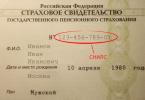Employees of the Federal Migration Service claim that in 2017 more than 200,000 foreigners may be deported from the Russian state. The deportation of foreign citizens will be carried out in the near future.
The expulsion of foreign persons from Russia is a common occurrence. There are a variety of reasons for expulsion. Most often, foreigners are expelled from the Russian Federation in connection with a violation. Another reason for taking such harsh measures is the violation of migration rules.
The deportation of foreign persons is regulated by the Law “On the Stay of Foreign Citizens in the Russian Federation”.
According to the law, deportation is understood as the involuntary expulsion of a foreigner to another country. The European Convention on Human Rights states that even the most notorious criminal cannot be expelled from a country if he is a citizen. That is, a ban on entry into your country is not possible.
Today, deportation is an administrative punishment. It is relevant for foreigners and stateless persons. Deportation can be either voluntary or forced. In the latter case, a person is forced to leave the country under escort.
Who can be deported
The grounds for expulsion can be very different. The existing Law assumes that the following are subject to this punishment:
- foreigners living in Russia with forged documents;
- foreigners who have violated the rules of stay on the territory of Russia;
- foreigners who have lost their legal grounds for living in the Russian state;
- foreigners who do not have a registration card in their hands;
- foreigners who have violated the Law of the Russian Federation.
Also, the grounds for deportation include the undesirability of a person being in Russia. A person who refuses to voluntarily leave the country is expelled under escort. If the law provides for a reduction in the period of stay in the territory of the Russian Federation, then a person undertakes to leave the country within 72 hours. If the basis for the forced departure was the cancellation of the residence permit, then the person undertakes to leave the Russian Federation within 5 calendar days.

Deportation is not possible
- refugees;
- foreigners who have requested political asylum;
- foreigners who filed;
- citizens of countries in which active hostilities are taking place;
- employees of the diplomatic institutions.
Expulsion of stateless persons from the Russian Federation
Today, the issue of deportation of stateless persons is quite acute. According to the existing law, it is defined as an individual who does not have citizenship. It is not possible to establish the belonging of a stateless person to one or another power.
Usually, deportation is carried out in relation to stateless persons who have violated the law and served their sentences on the territory of Russia. The deportation of stateless persons is based on the “undesirability of being” in Russia.
If it is impossible to identify the receiving party, then the deportation of a stateless person is transformed into an indefinite imprisonment.
The decision regarding the forced expulsion of a stateless person from Russia is far from always legal. If a person clearly knows that he is being persecuted by the authorities illegally, he can appeal the decision to deport. An unlawful decision can be appealed both administratively and in court.

Features of deportation
The final decision regarding the expulsion of a foreigner from Russia can only be made at the state level. The procedure for deportation is dictated by Russian law.
The procedure for expelling foreigners from Russia is as follows:
- at the end of the period of legal stay in Russia, a person undertakes to leave its borders within 3 calendar days;
- when the documents of a foreign person are canceled, the terms of departure increase to 15 days;
- expulsion is carried out solely on the basis of a court decision;
- A person "sentenced" to expulsion is in special custody. room.
A foreigner, as well as a stateless person, has the right to appeal against a court decision. A person has only 10 working days to submit the relevant application. A foreigner can apply only after receiving notification.

Payment for home travel
The expulsion of a foreign person from Russia is carried out at the expense of:
- The foreigner himself.
- An individual or organization that invited a foreigner.
- Dip. institutions of the country of which the deportee is a citizen.
- Russian Federation (this is relevant only if the first three points are not possible).
Cancellation conditions
Sometimes the deportation of a foreign person is cancelled. This is relevant in case:
- the deportee has relatives with Russian citizenship;
- marriage with a citizen of Russia;
- having a residence permit;
- the presence of a labor patent;
- undergoing treatment;
- study at one of the Russian universities (the university must be accredited in the territory of the Russian Federation).
The decision of the court is not immediately annulled. Before that, the person who appealed the court decision undertakes to undergo a rather lengthy procedure. Also, a person must prepare a package of documents in a timely manner, on the basis of which he will be allowed to continue to stay in Russia.

Features of passport verification
If a person was deported from the Russian Federation, then further entry into the territory of this country will be taboo for him. The term of the ban varies from 3 to 5 years. It is important to bear in mind that violators are not always informed about the terms of "sanctions". This often leads to misunderstandings and undesirable consequences for the deportee.
Most often, troubles arise when a person tries to cross the state border. This usually happens upon arrival in Russia. During the passage of passport control, a person who learns that the entry ban has not yet been lifted is expelled from the country again.

To avoid such an unenviable fate is quite simple. To do this, a person once deported from Russia must resort to on the official website of the FMS. The check makes it possible to clarify whether the documents of the deported person are in the Emergency Situations of the Border Guard Service of the Russian Federation.




